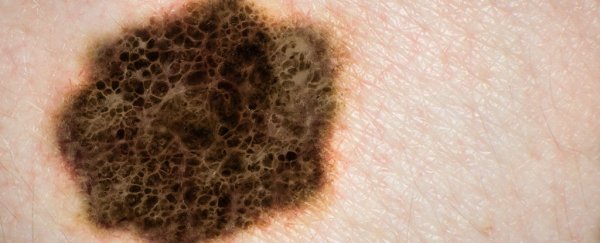You might not have heard of ipilimumab and nivolumab before, and that's okay, but these two immunotherapy drugs could be the future of skin cancer treatment. Studies have shown that a new treatment using both of these drugs together can clear melanoma skin cancer tumours in 22 percent of cases.
While the drugs have been used separately in the past, scientists now think that using them together could be much more effective. In a recent trial involving 142 patients, where both drugs were used as treatment, 69 percent of patients were still alive after two years, compared with 53 percent who were using ipilimumab alone.
These are promising figures, but there is a note of caution: more than half of those involved in the test developed severe or life-threatening side effects that put a stop to their treatment. More work is required before this effective drug combo can see wider use.
"It is very encouraging to see that survival rate," one of the team, James Larkin from the Royal Marsden Hospital in London, told the BBC. "It will be important in terms of working out the benefit of these treatments in the longer term, but nevertheless, it's a relatively small study still."
Our immune system is one of the best defences against disease, but cancerous cells use a variety of ways to evade detection and spread through the body. What ipilimumab and nivolumab do is 're-educate' the immune system and help our bodies start fighting back against the disease.
Because of the side effects, this could end up being a treatment that's only suitable for certain types of patients, experts have advised. "We need to identify which patients are most likely to benefit from this combination and also which patients are most likely to experience the side effects," said Cancer Research UK's Richard Marais, who was not involved in the trials.
Melanoma is the most serious form of skin cancer, and is estimated to be responsible for around 10,000 deaths per year in the US. Survival rates can vary from 15 to 97 percent, depending on how early it's detected.
Separate research into the effectiveness of immunotherapy was published last year, though again, the side effects were worrying. But even with the downsides, scientists are saying this could eventually lead to a major breakthrough in the way we treat all kinds of cancers. What makes it particularly exciting is the way the tumours are destroyed rather than just suppressed or slowed down.
The results of another two-year study using a combination of ipilimumab and nivolumab - this time involving 1,000 patients - are expected next year.
"The evidence emerging from clinical trials suggests that we are at the beginning of a whole new era for cancer treatments," Cancer Research UK's Peter Johnson told The Telegraph. "Some of the most common types of cancer seem to be treatable with immunotherapy."
Results of the latest melanoma study have been presented at the 2016 American Association for Cancer Research Annual Meeting in New Orleans.
